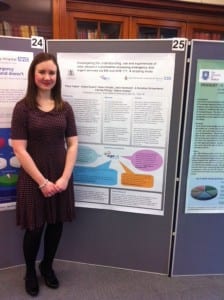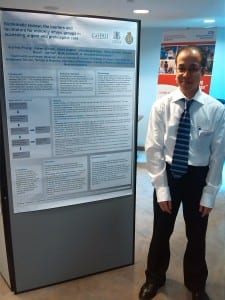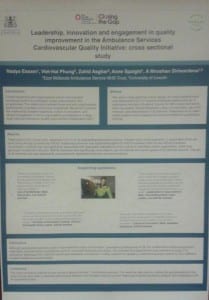 Viet-Hai Phung, researcher at CaHRU, recently attended the College of Paramedics national conference at Warwick University on 6-7th October 2014. This organisation, formerly the British Paramedic Association, represents the professional interests of prehospital clinicians in the UK. Viet-Hai was one of the few health researchers attending the conference, albeit one with an interest in prehospital care. He presented a poster entitled, ‘Leadership, innovation and engagement in quality improvement in the Ambulance Services Cardiovascular Quality Initiative: cross sectional survey’ which showcased the team’s work exploring leadership and innovation through the Ambulance Service Cardiovascular Quality Initiative (ASCQI). Delegates were interested in the collaboration between the University of Lincoln and East Midlands Ambulance Service (EMAS), so from that point of view, CaHRU did indeed raise its profile.
Viet-Hai Phung, researcher at CaHRU, recently attended the College of Paramedics national conference at Warwick University on 6-7th October 2014. This organisation, formerly the British Paramedic Association, represents the professional interests of prehospital clinicians in the UK. Viet-Hai was one of the few health researchers attending the conference, albeit one with an interest in prehospital care. He presented a poster entitled, ‘Leadership, innovation and engagement in quality improvement in the Ambulance Services Cardiovascular Quality Initiative: cross sectional survey’ which showcased the team’s work exploring leadership and innovation through the Ambulance Service Cardiovascular Quality Initiative (ASCQI). Delegates were interested in the collaboration between the University of Lincoln and East Midlands Ambulance Service (EMAS), so from that point of view, CaHRU did indeed raise its profile.
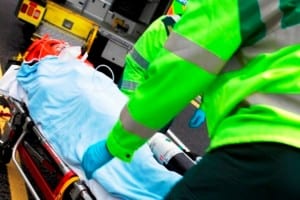 The College’s Chair, Andy Newton, opened the proceedings on both days. There were a number of enlightening presentations from the UK, including the problems the ambulance service faces in delivering an effective response to mental health issues and how it deals with end-of-life care. Professor Keith Willett, who is leading the review into urgent and emergency care in England, outlined the future challenges for prehospital care in the UK.
The College’s Chair, Andy Newton, opened the proceedings on both days. There were a number of enlightening presentations from the UK, including the problems the ambulance service faces in delivering an effective response to mental health issues and how it deals with end-of-life care. Professor Keith Willett, who is leading the review into urgent and emergency care in England, outlined the future challenges for prehospital care in the UK.
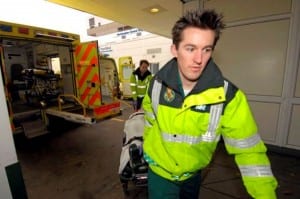 As well as the domestic picture, delegates learned more about how ambulance services operate in countries as diverse as the USA, South Africa, Australia, Austria and Switzerland. Professor Jerry Overton highlighted that the USA, like the UK, is focusing too much on outputs rather than outcomes. Kai Kranz, from the Swiss Paramedic Association, emphasised the fragmented nature of their ambulance service, arising from regional and linguistic differences. It was a well-organised, informative conference, giving all delegates much to think about. Looking forward to the next one in 2015!
As well as the domestic picture, delegates learned more about how ambulance services operate in countries as diverse as the USA, South Africa, Australia, Austria and Switzerland. Professor Jerry Overton highlighted that the USA, like the UK, is focusing too much on outputs rather than outcomes. Kai Kranz, from the Swiss Paramedic Association, emphasised the fragmented nature of their ambulance service, arising from regional and linguistic differences. It was a well-organised, informative conference, giving all delegates much to think about. Looking forward to the next one in 2015!
Viet-Hai Phung


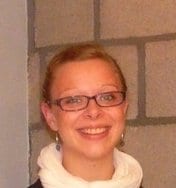



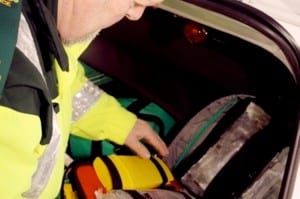
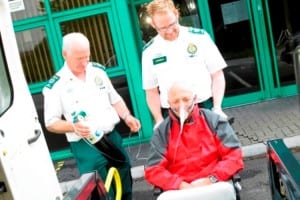



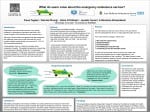
![Togher PhOEBE qualitative HSRN 2014 [Poster]](https://communityandhealth.dev.lincoln.ac.uk/files/2014/07/Togher-PhOEBE-qualitative-HSRN-2014-Poster-300x225.jpg)
